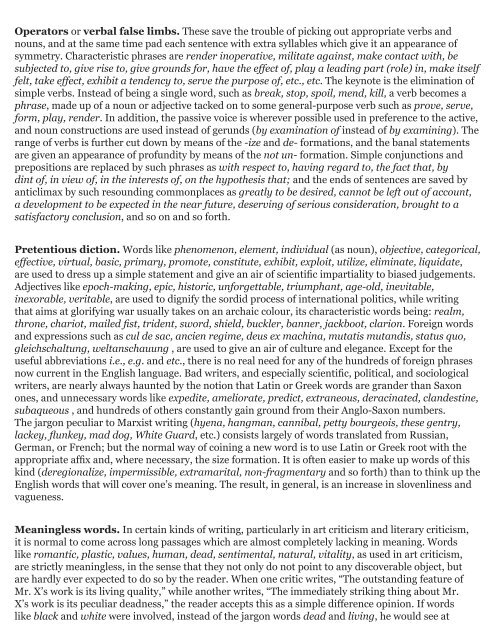Illegitimi non carborundum
Illegitimi non carborundum
Illegitimi non carborundum
Create successful ePaper yourself
Turn your PDF publications into a flip-book with our unique Google optimized e-Paper software.
Operators or verbal false limbs. These save the trouble of picking out appropriate verbs and<br />
nouns, and at the same time pad each sentence with extra syllables which give it an appearance of<br />
symmetry. Characteristic phrases are render inoperative, militate against, make contact with, be<br />
subjected to, give rise to, give grounds for, have the effect of, play a leading part (role) in, make itself<br />
felt, take effect, exhibit a tendency to, serve the purpose of, etc., etc. The keynote is the elimination of<br />
simple verbs. Instead of being a single word, such as break, stop, spoil, mend, kill, a verb becomes a<br />
phrase, made up of a noun or adjective tacked on to some general-purpose verb such as prove, serve,<br />
form, play, render. In addition, the passive voice is wherever possible used in preference to the active,<br />
and noun constructions are used instead of gerunds (by examination of instead of by examining). The<br />
range of verbs is further cut down by means of the -ize and de- formations, and the banal statements<br />
are given an appearance of profundity by means of the not un- formation. Simple conjunctions and<br />
prepositions are replaced by such phrases as with respect to, having regard to, the fact that, by<br />
dint of, in view of, in the interests of, on the hypothesis that; and the ends of sentences are saved by<br />
anticlimax by such resounding commonplaces as greatly to be desired, cannot be left out of account,<br />
a development to be expected in the near future, deserving of serious consideration, brought to a<br />
satisfactory conclusion, and so on and so forth.<br />
Pretentious diction. Words like phenome<strong>non</strong>, element, individual (as noun), objective, categorical,<br />
effective, virtual, basic, primary, promote, constitute, exhibit, exploit, utilize, eliminate, liquidate,<br />
are used to dress up a simple statement and give an air of scientific impartiality to biased judgements.<br />
Adjectives like epoch-making, epic, historic, unforgettable, triumphant, age-old, inevitable,<br />
inexorable, veritable, are used to dignify the sordid process of international politics, while writing<br />
that aims at glorifying war usually takes on an archaic colour, its characteristic words being: realm,<br />
throne, chariot, mailed fist, trident, sword, shield, buckler, banner, jackboot, clarion. Foreign words<br />
and expressions such as cul de sac, ancien regime, deus ex machina, mutatis mutandis, status quo,<br />
gleichschaltung, weltanschauung , are used to give an air of culture and elegance. Except for the<br />
useful abbreviations i.e., e.g. and etc., there is no real need for any of the hundreds of foreign phrases<br />
now current in the English language. Bad writers, and especially scientific, political, and sociological<br />
writers, are nearly always haunted by the notion that Latin or Greek words are grander than Saxon<br />
ones, and unnecessary words like expedite, ameliorate, predict, extraneous, deracinated, clandestine,<br />
subaqueous , and hundreds of others constantly gain ground from their Anglo-Saxon numbers.<br />
The jargon peculiar to Marxist writing (hyena, hangman, cannibal, petty bourgeois, these gentry,<br />
lackey, flunkey, mad dog, White Guard, etc.) consists largely of words translated from Russian,<br />
German, or French; but the normal way of coining a new word is to use Latin or Greek root with the<br />
appropriate affix and, where necessary, the size formation. It is often easier to make up words of this<br />
kind (deregionalize, impermissible, extramarital, <strong>non</strong>-fragmentary and so forth) than to think up the<br />
English words that will cover one’s meaning. The result, in general, is an increase in slovenliness and<br />
vagueness.<br />
Meaningless words. In certain kinds of writing, particularly in art criticism and literary criticism,<br />
it is normal to come across long passages which are almost completely lacking in meaning. Words<br />
like romantic, plastic, values, human, dead, sentimental, natural, vitality, as used in art criticism,<br />
are strictly meaningless, in the sense that they not only do not point to any discoverable object, but<br />
are hardly ever expected to do so by the reader. When one critic writes, “The outstanding feature of<br />
Mr. X’s work is its living quality,” while another writes, “The immediately striking thing about Mr.<br />
X’s work is its peculiar deadness,” the reader accepts this as a simple difference opinion. If words<br />
like black and white were involved, instead of the jargon words dead and living, he would see at














![The Philosophy of Progress [pdf]](https://img.yumpu.com/14077359/1/190x245/the-philosophy-of-progress-pdf.jpg?quality=85)

